The 80s was a decade that brought about some of the greatest and most influential thrash metal bands in history. This subgenre of heavy metal music originated in the United States and quickly gained popularity around the world. With fast-paced guitar riffs, aggressive vocals, and politically charged lyrics, thrash metal captured the hearts and minds of many rebellious youth during this time.
While the Big Four (Metallica, Slayer, Megadeth, and Anthrax) are often credited as the pioneers of thrash metal, there were many other incredible bands that contributed to the development and success of this genre. In this document, we will take a closer look at some of the best 80s thrash metal bands that deserve recognition for their impact on the music world.
Table of Contents
Nuclear Assault
Formed in 1984, Nuclear Assault was a highly influential New York-based band that emerged during the golden era of thrash metal. With their unique fusion of punk and thrash elements, they crafted a sound that captivated audiences and set them apart from their peers.
In 1986, they unleashed their groundbreaking debut album, “Game Over,” which instantly established them as a force to be reckoned with in the metal world. Known for its blistering speed, aggressive riffs, and politically charged lyrics, the album resonated with fans who were hungry for a new wave of metal that pushed boundaries.
Although the band disbanded in 1995, their legacy lives on. Nuclear Assault’s music continues to inspire countless artists and fans alike, and their impact on the thrash metal genre cannot be overstated. Their uncompromising energy and unwavering dedication to their craft have cemented their place in the annals of metal history.[2]
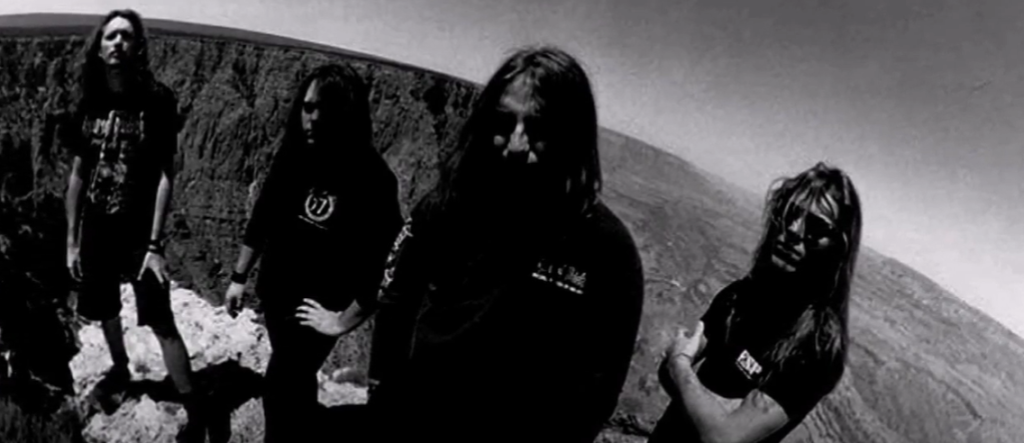
Dark Angel
Formed in 1981 in the vibrant city of Los Angeles, Dark Angel emerged as one of the most influential and formidable thrash metal bands of their era. Renowned for their uncompromising and aggressive style, they pushed the boundaries of the genre with their relentless energy and raw musical talent. Led by the powerhouse vocals of frontman Ron Rinehart, the band unleashed a sonic assault with lightning-fast guitar solos, thunderous drumming, and a ferocity that captivated fans worldwide. With iconic albums like Darkness Descends and Leave Scars, Dark Angel cemented their status as a true force to be reckoned with in the thriving thrash metal scene, leaving an indelible mark on the history of heavy music.[2]
Sepultura
Formed in Belo Horizonte, Brazil in 1984, Sepultura is a legendary band that has left an indelible mark on the music world. With their unique fusion of thrash metal and Brazilian indigenous music, they carved out a distinctive sound that set them apart from their peers. Sepultura’s early albums, like the iconic “Beneath the Remains” and “Arise,” are widely regarded as masterpieces in the thrash metal genre.
Songs like “Refuse/Resist” and “Dead Embryonic Cells” became anthems for the disaffected youth of the 80s, resonating with their rebellious spirit and addressing the social issues of the time. Sepultura’s music not only showcased their immense talent but also delved into political and social themes, giving their music a deeper meaning and further solidifying their place in the thrash metal scene.
Over the years, Sepultura’s influence has transcended generations and genres, inspiring countless bands and musicians. Their impact can still be felt in the modern music landscape, as they continue to tour and release new music that pushes the boundaries of their craft. Sepultura’s enduring legacy is a testament to their artistic vision and unwavering commitment to their music.[2]
Kreator
Founded in 1982, Kreator is a German thrash metal band that is still going strong today. Originally named Tormentor, the band decided to change their name to Kreator in 1984 after discovering another band with the same name. Their debut album “Endless Pain” (1985) marked a pivotal moment for the band, propelling them into the metal scene and gaining recognition. With the release of subsequent successful albums like “Pleasure to Kill” (1986) and “Terrible Certainty” (1987), Kreator solidified their position as a force to be reckoned with in the thrash metal genre. Known for their blistering fast tempos, aggressive vocals, and socially conscious lyrics, Kreator’s music continues to captivate and inspire metal fans worldwide. Their enduring presence in the music industry is a testament to their talent, dedication, and unwavering passion for their craft.[2]
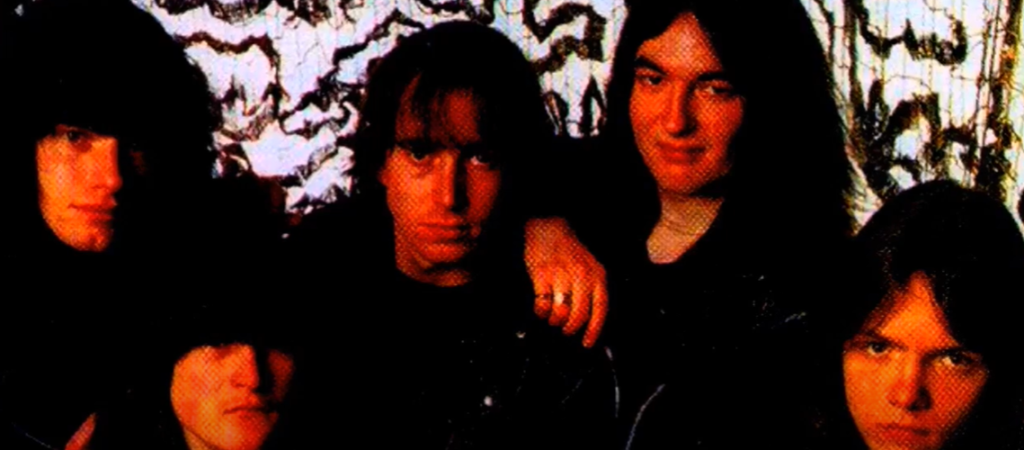
Overkill
Formed in 1980 in New Jersey, Overkill quickly emerged as a prominent force in the world of heavy metal. Known for their raw and energetic sound, they captured the essence of the thrash metal movement. Their early albums, such as “Feel the Fire” and “Taking Over”, gained critical acclaim and are now considered thrash metal classics, solidifying their place in the genre’s history.
With a discography boasting 19 studio albums, Overkill has consistently delivered their signature brand of hard-hitting music over the years. Their relentless dedication to their craft has earned them a loyal fanbase and allowed them to maintain a strong presence in the metal scene. Despite the evolving landscape of the music industry, Overkill continues to tour extensively and captivate audiences with their electrifying live performances, proving that their passion for music remains as strong as ever.[2]
Testament
Formed in 1983, Testament quickly made a name for themselves with their raw and intense sound. Hailing from the Bay Area thrash metal scene, they emerged as one of the genre’s most influential bands. With albums like “The Legacy” and “Practice What You Preach”, Testament not only solidified their place in the thrash metal pantheon but also pushed the boundaries of the genre with their technical guitar work, powerful vocals, and thought-provoking lyrics.
Their impact and influence extended beyond their contemporaries, earning them a spot among the greats of metal music. Testament’s longevity in the industry is a testament to their unwavering dedication to their craft and the relentless energy they bring to their live performances. With each new release and tour, they continue to captivate audiences and inspire a new generation of metalheads.
From their early days in the ’80s to the present, Testament remains a force to be reckoned with, combining aggression, precision, and a distinct musical identity that sets them apart. Their unwavering commitment to their art has made them icons in the thrash metal scene and earned them a dedicated fanbase worldwide. Testament’s legacy as one of the greatest metal bands of all time is firmly established and continues to grow with each passing year.[4]
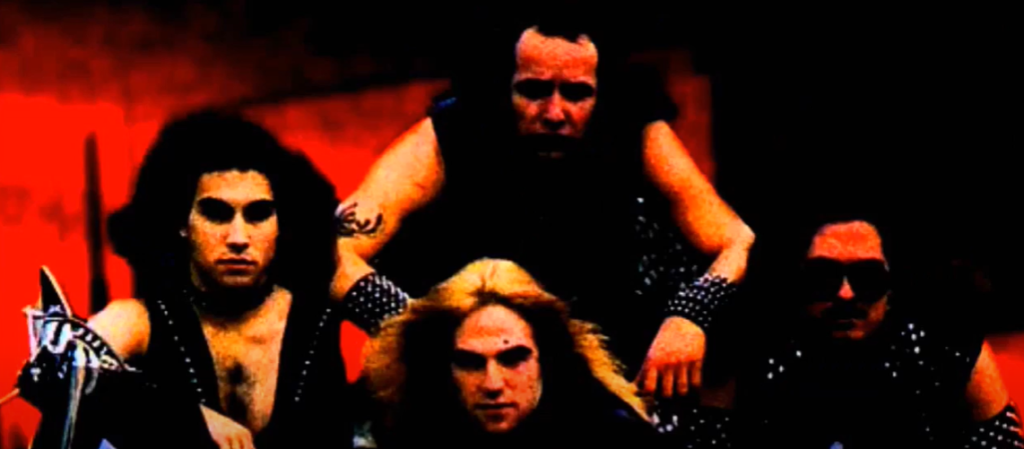
Exodus
Formed in 1980 in Richmond, California, Exodus is widely recognized as one of the pioneering thrash metal bands that emerged on the music scene. With their aggressive and relentless sound, combined with their chaotic and electrifying live performances, they quickly garnered a dedicated and passionate following of metalheads. Their groundbreaking debut album “Bonded by Blood,” which was unleashed upon the world in 1985, continues to be hailed as an absolute masterpiece and is revered as one of the most influential and iconic thrash metal albums of all time. With its blistering riffs, thunderous drumming, and raw energy, “Bonded by Blood” solidified Exodus’ place in the annals of heavy metal history, leaving an indelible mark on the genre and inspiring countless bands that followed in their footsteps.[4]
Anthrax
Formed in 1981 in New York City, Anthrax quickly rose to prominence as one of the pioneering thrash metal bands from the East Coast. With their aggressive riffs and fast-paced drumming, they brought a unique blend of punk and hardcore elements to the genre. Their debut album, “Fistful of Metal” (1984), showcased their raw talent and set the stage for their future success.
Beyond their musical prowess, Anthrax also made waves by collaborating with rap group Public Enemy on the groundbreaking song “Bring the Noise”. This unexpected collaboration highlighted their willingness to push boundaries and experiment with different genres, cementing their status as innovators in the metal world.
Throughout their career, Anthrax has remained a force to be reckoned with, continuously evolving their sound and delivering electrifying live performances. With their unique blend of aggression, melody, and precision, they have left an indelible mark on the thrash metal genre and continue to inspire generations of musicians and fans alike.[4]
Slayer
Formed in 1981 in Huntington Park, California, Slayer quickly rose to fame with their blistering and relentless style of music. Their aggressive guitar riffs, thunderous drums, and menacing vocals captivated audiences worldwide. They were renowned for pushing the boundaries with their controversial and often dark lyrics, delving into themes of death, religion, and the human condition. This provocative approach sparked both outrage and fascination, solidifying their anti-establishment image.
With iconic albums like “Reign in Blood”, a relentless onslaught of speed and aggression, and “South of Heaven”, a haunting exploration of darkness and introspection, Slayer etched their name in the annals of thrash metal history. Their relentless energy and uncompromising approach set a new standard for the genre, inspiring countless bands and leaving an indelible mark on the world of music.[1]
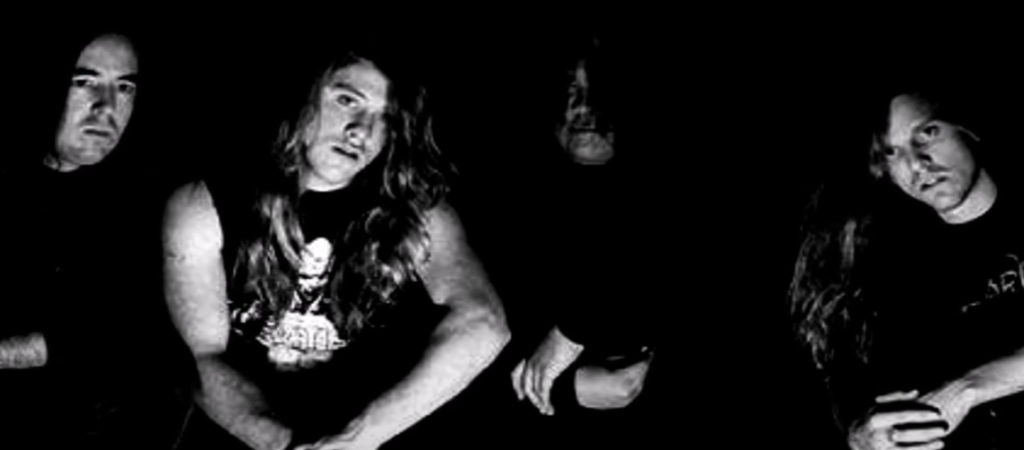
Metallica
Formed in 1981, Metallica quickly rose to become one of the most influential bands in the history of thrash metal. Their impact on the genre cannot be overstated. With their groundbreaking albums like “Kill ‘Em All,” “Ride the Lightning,” and “Master of Puppets,” Metallica not only set a high standard for what thrash metal should sound like but also pushed the boundaries of the genre itself.
Their heavy riffs, blistering guitar solos, and aggressive vocals captivated audiences worldwide. Metallica’s music was not only a sonic assault but also a platform for politically charged lyrics that challenged societal norms and sparked introspection. Their songs addressed themes of war, government corruption, and social injustice, resonating with a generation hungry for change.
Metallica’s success and longevity are a testament to their unwavering dedication to their craft and their ability to evolve with the ever-changing music landscape. With countless sold-out concerts, millions of albums sold, and an unparalleled fan base, Metallica has solidified their place as one of the greatest thrash metal bands of the 80s and beyond.
Their impact extends beyond the music industry, as Metallica’s influence can be felt in the countless bands that have been inspired by their sound and approach to music. Their legacy continues to inspire new generations of musicians to push the boundaries of heavy metal and create music that is both powerful and meaningful.[1]
Megadeth
Formed in 1983 by former Metallica guitarist Dave Mustaine, Megadeth quickly rose to fame with their technical and aggressive style of thrash metal. With albums like “Peace Sells…but Who’s Buying?” and “Rust in Peace,” Megadeth solidified their place as one of the most technically proficient and influential bands in the genre. Their music was a perfect blend of speed, aggression, and melodic undertones, showcasing the band’s incredible musicianship.
But Megadeth’s impact goes beyond their musical prowess. With politically charged lyrics that tackled themes of war, corruption, and personal struggles, Megadeth became the voice of a generation looking for something more meaningful in their music. Their songs resonated with fans who found solace in the band’s unapologetic and thought-provoking approach to music.
With over three decades of success, Megadeth continues to be a driving force in the world of thrash metal. Their constant evolution and ability to stay relevant have cemented their place as one of the best 80s thrash metal bands, inspiring countless musicians and fans around the world.[1]
Death Angel
Formed in San Francisco in 1982, Death Angel quickly established themselves as one of the most promising thrash metal bands from the Bay Area. With their debut album, “The Ultra-Violence” (1987), they showcased their technical abilities and unique blend of melodic and aggressive elements. Their music was a perfect balance of intensity and complexity, captivating audiences worldwide.
However, it was their sophomore album, “Frolic Through the Park” (1988), that really put Death Angel on the map. This critically acclaimed album featured hits like “The Ultra-Violence” and “Bored”, showcasing the band’s versatility and ability to create memorable songs with powerful messages.
Despite facing challenges and setbacks throughout their career, Death Angel has continued to deliver high-octane thrash metal with albums like “The Dream Calls for Blood” (2013) and “Humanicide” (2019). Their dedication, resilience, and unwavering passion for music have solidified their place as one of the top 80s thrash metal bands. And with a new album set to release in 2021, it is clear that Death Angel’s legacy will continue to inspire future generations of thrash metal musicians and fans.[1]
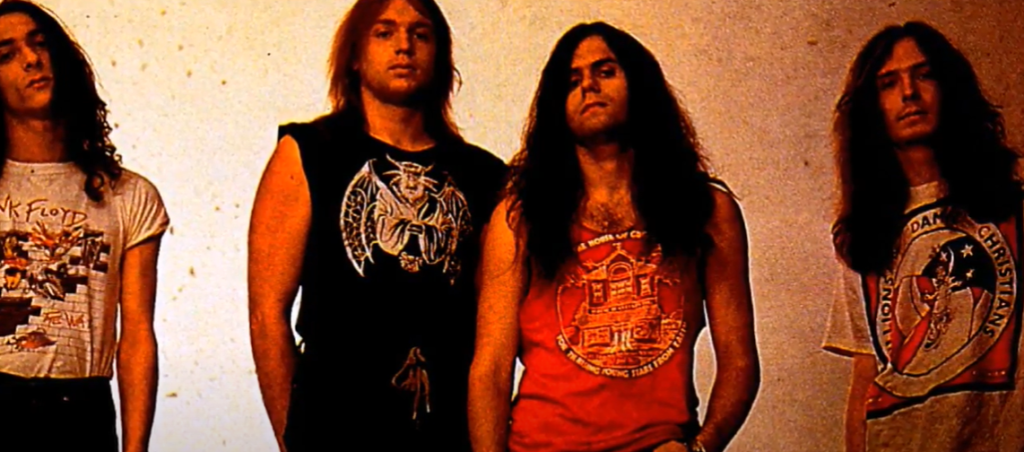
Forbidden
Formed in 1985, Forbidden quickly gained attention for their technical and aggressive style of music. With their debut album, “Forbidden Evil” (1988), they established themselves as a force to be reckoned with in the world of thrash metal. The band’s unique blend of speed, complexity, and aggression set them apart from other bands in the genre. And with their follow-up album, “Twisted into Form” (1990), Forbidden solidified their place as one of the most talented and innovative bands in the 80s thrash metal scene.
Unfortunately, internal conflicts and external challenges led to the band’s disbandment in 1997. However, they reunited in 2001 and have since released two more albums, “Omega Wave” (2010) and “Forbidden Evil” (2015). Their impact on the genre cannot be ignored, as Forbidden’s music continues to inspire new generations of thrash metal musicians.[3]
Vio-lence
Another band from the Bay Area thrash metal scene, Vio-lence formed in 1985 and quickly gained recognition for their intense live performances and technical musicianship. With their debut album, “Eternal Nightmare” (1988), they established themselves as one of the most promising thrash metal bands of the 80s.
Although they disbanded in 1993, Vio-lence’s legacy continues to live on through their influential music and dedicated fan base. And with a reunion in 2018, the band has proven that their impact on the thrash metal genre is far from over.[3]
Whiplash
Formed in 1984, Whiplash quickly became known for their breakneck speed and aggressive style of thrash metal. Their debut album, “Power and Pain” (1986), was a thunderous testament to their raw talent, unapologetic approach, and unrivaled intensity. With relentless tracks like “Ticket to Mayhem” (1987) and “Insult to Injury” (1989), Whiplash fearlessly pushed the boundaries of thrash metal, solidifying their position as one of the most electrifying and influential bands from the vibrant 80s scene.
Throughout their journey, Whiplash faced tumultuous challenges and lineup changes, but their unwavering dedication fueled their drive to deliver high-octane music that resonates with the soul. With albums like “Unborn Again” (2009) and “Old School American Way” (2016), they continue to unleash a sonic assault that captivates and invigorates. The indelible impact they have made on the genre is undeniable, inspiring legions of new generations to embrace the unbridled power of thrash metal.
So, if you are a devotee of adrenaline-fueled, aggressive music, Whiplash is unequivocally a band that demands your attention. Prepare to be swept away by their relentless energy and immerse yourself in the sonic maelstrom that defines the essence of Whiplash.[3]
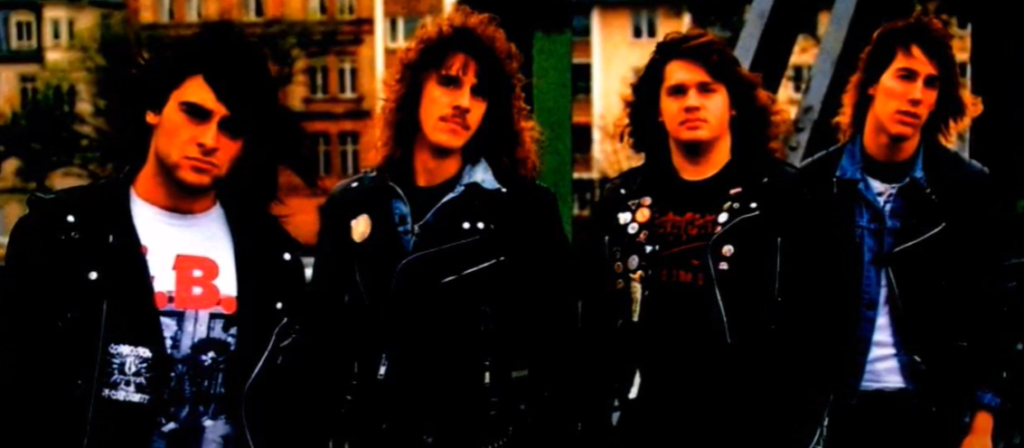
FAQ
Was 1986 the best year for thrash metal?
While 1986 is often considered a golden year for thrash metal, with many iconic albums being released, it’s subjective to say whether it was the best year. Many other years in the 80s also saw amazing releases from thrash metal bands and each one holds its own significance in the genre’s evolution. However, there’s no denying that 1986 was a pivotal year for thrash metal and played a major role in shaping the genre as we know it today.
Who were the 4 original thrash metal bands?
The 4 original thrash metal bands are often considered to be Metallica, Megadeth, Slayer, and Anthrax. These four bands played a significant role in the development and popularization of thrash metal in the 1980s. However, there were also other influential bands like Exodus, Testament, and Overkill that contributed to the rise of thrash metal during that time.
Who is the god of thrash metal?
There is no one specific “god” of thrash metal, as the genre has evolved and expanded over the years. Each band and musician brings their own unique style and sound to the genre, making it impossible to choose just one representative. However, there are many influential bands that have contributed to the growth of thrash metal and continue to inspire new generations of musicians, such as Metallica, Megadeth, Slayer, and Anthrax.
What are the big 5 of thrash metal?
The “Big 4” of thrash metal are often considered to be Metallica, Megadeth, Slayer, and Anthrax. However, many fans also include Testament as the fifth member of the group, sometimes referred to as the “Big 5” of thrash metal. These bands were all pioneers in the genre and continue to be influential forces in the metal world. So whether you consider it the “Big 4” or the “Big 5,” there’s no denying that these bands have made a significant impact on thrash metal and its evolution throughout the years.
Who started thrash metal?
The origins of thrash metal can be traced back to the late 1970s and early 1980s, with bands like Motörhead, Venom, and Diamond Head incorporating elements of speed and aggression into their music. However, it was the “Big 4” mentioned above that really popularized the genre and brought it to the forefront of the metal scene. These bands took inspiration from punk, hardcore, and traditional metal to create a new sound that would become known as thrash metal.
Is Metallica heavy or thrash?
Metallica is considered to be both heavy metal and thrash metal. They began as a traditional heavy metal band in the early 1980s, but with their third album “Master of Puppets” (1986), they fully embraced the thrash metal sound and became one of the pioneers of the genre. However, they have also experimented with different styles over the years, making it difficult to categorize them into one specific genre.
Why is thrash metal good?
There are many reasons why thrash metal is considered to be a great genre of music. For one, it is characterized by its fast-paced and aggressive sound, making it perfect for releasing energy and letting out frustrations. Thrash metal also often features complex guitar riffs and solos, showcasing the technical abilities of the musicians.
Who is the Big 4 metal?
The “Big 4” of metal refers to the four bands that are often considered to be the pioneers and most influential in the genre of thrash metal. These bands are Metallica, Megadeth, Slayer, and Anthrax. However, some fans also include Testament as a fifth member, making it the “Big 5” of metal. These bands have all made a significant impact on the metal world and continue to be celebrated by fans around the world. So whether it’s the “Big 4” or “Big 5,” there’s no denying that these bands are at the top of their game.
Why did Metallica stop making thrash?
After the release of their fifth album “Metallica” (1991), also known as “The Black Album,” Metallica began to experiment with different styles and sounds, moving away from their thrash metal roots. Some fans speculate that this was due to pressure from their record label and the desire for more mainstream success. However, the band has continued to incorporate elements of thrash metal into their music, proving that they will always be a part of the genre’s legacy.
Useful Video: Best 80’s Thrash Metal Albums NOT From “The BIG 4”
Conclusion
In conclusion, the 80s saw an explosion of thrash metal bands that pushed the boundaries of heavy music. From the iconic “Big 4” to bands like Whiplash and Exodus, these musicians created a sound that was fast, aggressive, and energetic, revolutionizing the metal scene. Today, their influence can still be heard in new generations of thrash metal bands, cementing their place in music history. So if you’re a fan of thrash metal, go ahead and blast some classic tunes, because the legacy of these 80s bands lives on.
References:
- https://www.albumoftheyear.org/ratings/user-highest-rated/1980s/thrash-metal/
- https://www.loudersound.com/features/the-10-essential-80s-thrash-metal-albums
- https://www.houstonpress.com/music/10-important-80s-thrash-bands-you-should-remember-8299583
- https://www.spin.com/2017/12/the-30-greatest-thrash-bands-of-all-time/

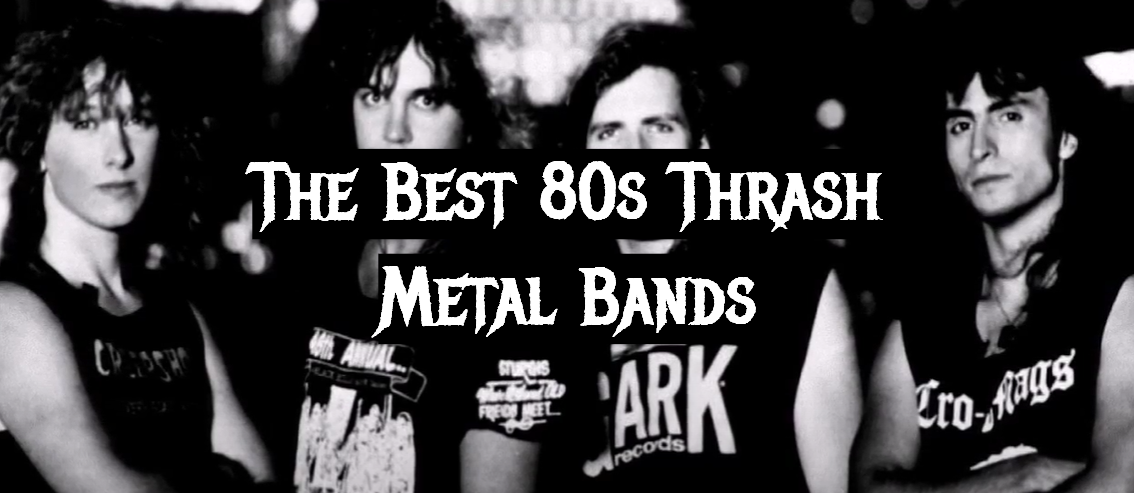

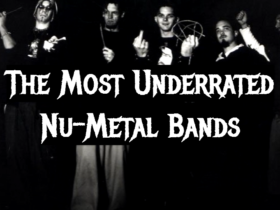


Leave a Reply